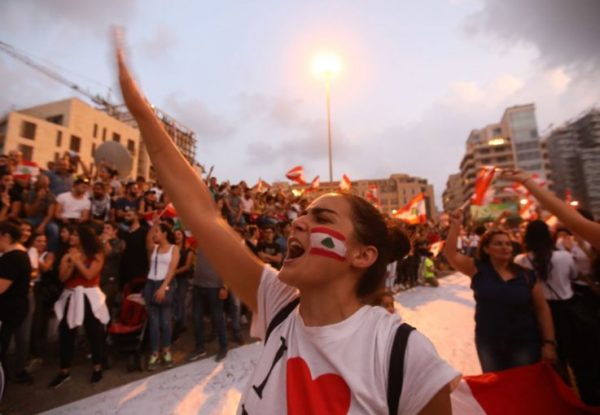
ANWAR AMRO/AFP/GETTY
Mass nationwide protests continued in Lebanon for a fourth day on Sunday, as local media reported more than a quarter of the Lebanese population had gone to the streets to join the movement, calling for the downfall of the government.
Mass nationwide protests continued in Lebanon for a fourth day on Sunday, as local media reported more than a quarter of the Lebanese population had gone to the streets to join the movement, calling for the downfall of the government.
Journalist and human rights researcher Kareem Chehayeb told Newsweek from the Lebanese capital Beirut that the size of the movement has been “unprecedented” over the past few days. “Local media has said there was about a million people in Beirut alone today. Yesterday was about 1.2 million across the country,” Chehayeb said. “The diversity and the scale of the protests nationwide is unprecedented for sure,” he added.
Although Lebanon has not held an official census in decades, the official Lebanese population is estimated to be comprised of just over 4 million citizens. Additionally, the country is home to about 1.5 million Syria refugees and nearly half a million Palestinian refugees.
While smaller protests had been ongoing for weeks, the movement ballooned last week after the government announced a series of new taxes and austerity measures. As of 2018, Lebanon was ranked as the third-highest indebted country in the world in terms of the ratio of debt-to-GDP, with a total public debt of more than $75 billion. Meanwhile, corruption has been widespread for decades, as the leading political families have maintained a grip on power for generations.
The Lebanese population has grown accustomed to daily scheduled power cuts, water cuts and a trash crisis, which began back in 2015 and has never been fully resolved. Despite the efforts of protesters and independent political activists, the ruling elite have done little, if anything, to address these concerns. This past week, as they announced a series of new taxes – including a $6 monthly charge to use online calling services, such as WhatsApp and Telegram – the situation reached a boiling point for much of the Lebanese population. Even after the government announced the repeal of some taxes, the anger has persisted.
“There’s a bit of hope, because for once you have only Lebanese flags in the street,” Joyce Rizkallah, a banker who has joined the protests, told Newsweek. “No [political] parties,” she explained, pointing out that the majority of demonstrators were calling for the removal of “everyone” in the government.
Lebanon’s complex confessionalism government system essentially codifies sectarian tensions into the country’s politics. The Mediterranean nation officially recognizes 18 religious sects, and each is guaranteed representation in the government. The largest sectarian groups, Sunni Muslims, Maronite Christians and Shia Muslims are guaranteed the top government posts, with the presidency always given to a Maronite, the prime ministership to a Sunni, and the speaker of parliament being a Shia.
Past popular movements have often been stymied by sectarian politics, with different groups reluctant to turn against their longtime political leaders. But this time, activists are hopeful that the movement is different. They pointed out that even in political strongholds of different sects, the people have risen up and called for the government’s ouster. On Saturday Samir Geagea – the leader of the Lebanese Forces, a Maronite Christian political group – called for his party’s four ministers to resign from the government.
“Generally speaking, the protesters are aligned, that the government should resign and hold earlier parliament elections,” Chehayeb said. “The priority would be to give an independent look into corruption and money laundering and public money– public funds misappropriation,” he explained. However, he also noted that there isn’t a clear path forward, as the movement is spontaneous and does not yet have a clear leadership structure.
Dima El-Ayache, a member of the American University of Beirut Secular Club, who has been involved with organizing student protests, told Newsweek that hundreds of students from various universities had joined the movement.
“We are victims of systematic oppression by our own government,” El-Ayache told Newsweek. “Today we are revolting because we are students that want to live in a country that does not oppress us, a country that is secular. We will stay in the streets until our demands are met.”
El-Ayache sent a list of demands put forward by the student demonstrators, which included the resignation of the government; the cancellation of new taxes; the immediate release of all detained activists; and the ending of abuses by local security forces, among others. Amnesty International over the weekend demanded that the Lebanese authorities show restraint, condemning the government for the “excessive use of tear gas as well as the beatings and harassment at gunpoint of protesters.” Hundreds of demonstrators were arrested as of Saturday, but the majority have since been reportedly released.
Rizkallah said that the protesters now want prominent activists and independent political groups to take the lead, to ensure the movement persists in an organized way. “There is hope,” she asserted. “It’s getting structured, it’s getting organized,” Rizkallah added, although she admitted it wasn’t clear what the precise path forward would be at this time.
“The working class element is pretty large. It is not organized by your typical civil society movements,” Chehayeb explained. “A lot of the people who are coming have been previous supporters of political parties, but have changed their minds,” he said. “It’s very interesting. This is all about the economy, and they tie it to things like sectarianism and other things, but it’s all about the economy.”
In response to the protesters, Prime Minister Saad Hariri deflected blame for the national crisis to other “factions” in the Lebanese government in a Friday address. However, he asserted that he realized there needed to be major reforms and asked the people for 72 hours to come forward with a new plan.
NEWSWEEK

Leave a Reply
You must be logged in to post a comment.